Today is the twentieth anniversary of one of the shows that changed my life (or, since I started watching when I was nine, determined it): Buffy the Vampire Slayer. In so many ways, Buffy is the quintessential 90s show (mostly because of the so-bad-they’re-good outfit choices), but two decades later, it still stands up as a feminist, literary work of art, one that spawned an entire academic field, not to mention an impassioned, opinionated fandom.
There are a few things almost all Buffy fans can agree on: seasons 2, 3, and 5 were the best, Dawn was the fucking worst, and no one cares about Riley. But there are at least a few aspects of Buffyhead dogma that I can’t get behind. Here are my eleven most unpopular opinions about Buffy the Vampire Slayer:
Buffy is the best character
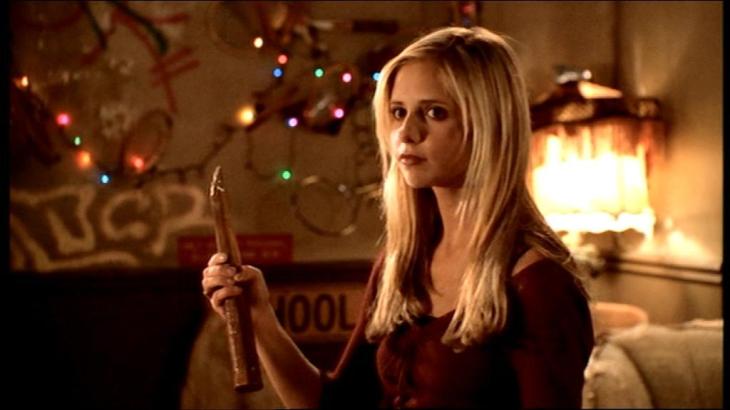
Everyone agrees that Buffy is an important character from a feminist perspective, but if you ask fans their favorite character, they’re more likely to say Willow, Spike, or Giles. And it’s become very fashionable nowadays, especially on forums like Reddit, to wave off Buffy’s significance as the result of a dearth of strong female characters. Fans often complain that she’s “self-righteous,” “annoying,” or boring compared to some of the other characters.
But I would argue that Buffy isn’t just an important character, she’s the most authentic and well-written character by a landslide. Where shows like Angel need to become true ensembles to make up for the weakness of the lead character, Buffy remains endlessly compelling throughout the seven-season run. The side characters are rounded, as is Joss’ way, but they are still very much side characters who, broadly speaking, aren’t particularly unique. Xander is the typical “Nice Guy” who’s actually an asshole. Spike is the villain who is redeemed by a romantic streak and his love for a “special” woman (yeah, I’ve never heard that one before).Willow has the biggest arc of the sidekicks, but still doesn’t feel as real as Buffy (more on that later). Giles is the wise authority figure with a past that’s dark enough to make him complex, but not dark enough to make him less lovable–so… literally Dumbledore.
Twenty years later, I still haven’t seen a character quite like Buffy. She’s the perfect embodiment of a certain type of “girly feminism,” a young girl who cares about things like makeup, clothes, and boys, but who can still believably bear the weight of the world on her shoulders. Even if she cares about trivial things, just as people of all genders do, she always keeps sight of what is most important. And her intense emotions, her ability to love other people, are not only portrayed neutrally, but as assets, as components of her strength and resilience.
There have been other great, spunky, resilient female characters since then–Veronica Mars springs to mind as the best analogue. But even Veronica unduly prizes her ability to feel nothing (or pretend to feel nothing) when disaster strikes. Buffy was more revolutionary because she didn’t derive her strength from a lack of feeling, but rather from her ability to channel her feeling into her moral convictions. Just as the character refuses to be molded into the type of hero the Council–a bunch of old white British men–want her to be, Buffy changed the entire paradigm of “strength” in our heroes. Rather than fulfilling the “special woman” archetype like many other female heroes, she represents a humanistic idea of strength that anyone can live up to: fighting to do the right thing every day of your life, even when it’s hard. Especially then.
Willow is not the best thing since sliced bread
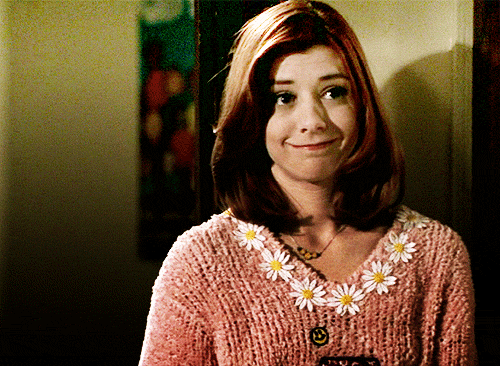
There is, of course, no denying Willow’s cultural importance. In the early seasons, she represented an intelligent, studious heroine whom bookish female fans could look up to, in the vein of Rory Gilmore. In later seasons, she was one of the few positive examples of LGBT representation on television at a time when well-developed, interesting, flawed lesbian characters were extremely rare.
All that being said, she’s not actually that likable a character. She’s entertaining, and I never resented her presence on the show, but she’s not a great character from a moral or even feminist perspective. Morally, she was always “nice” rather than “good.” She acts all sweet and innocent, and other characters put her on a pedestal, but she is often thoughtless and selfish. She cheats on Oz repeatedly, and while she’s upset about losing him, she barely seems to feel guilty about the hurt she causes Cordelia (probably because she has a nasty habit of calling Cordelia a “skanky ho”). She’s horribly sanctimonious about Buffy running away in response to that whole killing-her-true love-to-save-the-world thing, which is even more annoying when you consider how she reacted when Oz left/Tara died. And I realize that we’re supposed to chalk this up to addiction, but she wipes Tara’s memory after she had already told Willow it made her feel violated, which is pretty damn near unforgivable.
And her cultural importance notwithstanding, she isn’t even a particularly well-written character. While most of the time, flaws make a character more interesting, we never really get a sense of the source of Willow’s pain and anger. We meet her awful, neglectful mother once in the whole series, and that would have been an interesting angle to explore. But Joss, as much as I love him, has a weird aversion to parents, and so instead attributes her extreme selfishness and power-hunger to low self-esteem and bitterness over being a nerd in high school. This doesn’t make her compelling so much as it makes her a female, much less annoying version of Warren.
Season four is pretty damn great

Season four is, of course, not without its problems. Adam is by far the least interesting Big Bad of the series, and the conflicts between Buffy and her friends manage to be both overly telegraphed and kind of out-of-left-field. The pacing issues that plague almost every season are in full force in s4; a huge plot point will be introduced, and then a bunch of monster-of-the-week (MOW) episodes will deflate any momentum that has been amassed. And obviously, no one cares about Riley even a little bit.
But that being said, there are a lot of interesting things going on this season. Willow has one of the most graceful “coming out” arcs ever depicted on television. Spike finally becomes part of the gang and the show’s ever-reliable comic relief. The Thanksgiving episode has some of the funniest moments of the series (“You made a bear!!”). In the big picture, the season is sort of a mess, but on a granular level, it barely has more legitimately “bad” episodes than any of the early seasons. (“Where the Wild Things Are” is basically season four’s “The Zeppo.”)
And most importantly, Adam may have been a dud, but The Initiative is a fascinating antagonist. While it lasts, it’s a well-drawn conflict between Buffy’s out-of-the-box, open-minded approach to fighting evil and the Initiative’s uber-“masculine” mode of thought that prioritizes efficiency and rationality to the point of irrationality. (Really, their big mistake was killing Maggie halfway the season. How cool would it have been to see Buffy face off against a woman who nonetheless represents the patriarchy?) Considering that it is necessarily a transition year, the worst you can really say about season four is that it doesn’t live up to its potential.
Speaking of which…
“Beer Bad” isn’t that bad
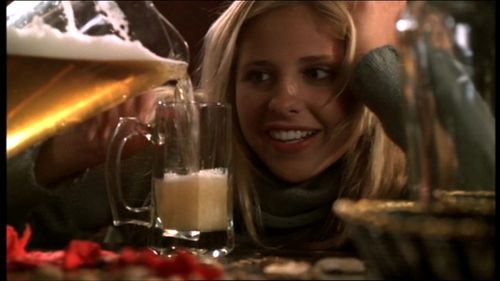
“Beer Bad” gets a bad rep, and I say this as someone who is generally predisposed against MOW episodes. It’s obviously more than a little silly, and campy even by Buffy‘s standards. But most of Buffy’s MOW episodes are silly, and can basically be considered successful if they’re entertaining and full of cute character moments. Is “Beer Bad” actually more lightweight or campy than popular MOW episodes like “Bad Eggs,” which is literally about Health Class eggs trying to kill Buffy and her friends?
People tend to give “Beer Bad,” as well as the also-underrated “Reptile Boy” and “Go Fish,” a harder time than other campy MOW episodes because they have a “very special episode” kind of message about the dangers of drinking and steroids. And yes, that preachiness doesn’t do these episodes any favors. But if you ask me, the only way a MOW episode can be a true failure is if it’s embarrassingly stupid and/or just plain boring (::cough::”Where the Wild Things Are”/”Doublemeat Palace”::cough::).
Hush is really just a gimmick
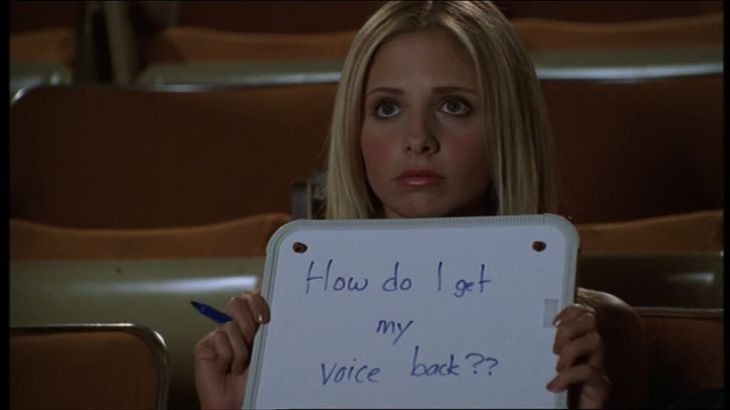
If you look at “Top Ten Episode” lists for Buffy, three episodes will almost always make an appearance: “Hush,” “One More with Feeling,” and “The Body,” mostly because they all represent a dramatic departure from the usual format of the show. But unlike “OMWF,” which essentially perfected the musical episode, and “The Body,” which is one of the best and most cinematic episodes of television ever aired, “Hush” doesn’t have much else going for it outside of its gimmick. Yes, it takes a lot of creativity to write almost an entire episode without any spoken dialogue (although you could argue that excessive use of white boards and slideshows are sort of cheating), and The Gentlemen are some of the creepiest villains that Buffy has ever produced. But aside from that, it’s just a particularly good MOW episode, and certainly not the ONE EPISODE deserving of an Emmy nomination.
Anya is just a poor man’s Cordelia

I know most fans love Anya, but I honestly don’t understand it. Emma Caulfield is lovely and talented and everything, but as written, she’s just a more cartoonish (and therefore less funny) version of Cordelia. Some of her running jokes are funny, like her all-consuming fear of bunnies, but overall her brand of humor is about as sophisticated as 90s sitcom characters who took things too literally (aka Phoebe, the least funny Friend [Phoebe is NOT the least funny friend! -Nerdy Spice]).
Cordelia is hilarious because she’s blunt and doesn’t want to act like a normal, tactful human being. Anya, on the other hand, is oblivious and dense to the point of unbelievability. We’re supposed to take for granted that she’s adjusting to life as a human after being a demon for ten centuries, but A) it would never take anyone that long to learn, especially since she is shown to have human feelings time and time again, B) her entire job as a vengeance demon has depended on her convincing humans that she was a nice, normal person. How the hell could she have forgotten how to act like a human when she’s had to pretend to be a human for a millennium?
And then after two years of “fish-out-of-water” humor, when we finally see flashbacks of her human days, she’s as tactless as ever. So… that’s just her human personality then? YOU CAN’T HAVE IT BOTH WAYS, JOSS.
SMG does a terrible Faith

Just to be clear, I think Sarah Michelle Gellar is a great and underrated actress, and like most Buffy fans, I thoroughly enjoyed “Who Are You?”. I agree with critics who say that SMG got to flex her acting muscles by playing a completely different character, but that character feels much more like Evil Buffy than Faith specifically. It’s fun to watch her channel Faith, but aside from liberal usage of Faith’s famous catchphrase, none of the mannerisms or speech patterns feel particularly familiar. If anything, her performance reminds me of Kathryn from Cruel Intentions. Which is a great thing on its own, obviously, but not quite what they were going for.
Spike is not the more feminist love interest

As much as I love myself a good shipper war, I won’t try to convince you that Angel is Buffy’s “twoo wuv,” or even that he’s a particularly feminist love interest. The character was pretty boring and one-note until he got his own show (and even then, he wasn’t, like, super layered), and a relationship between a 241-year-old man and a 16-year-old will probably never be actively feminist. And, of course, they literally can’t have sex without turning him evil, which is about as sex-negative as you can get.
That being said, I get a little annoyed that fans have collectively decided that Spike is the preferable love interest on a feminist level. Spike allows Buffy to explore her sexuality, and so her relationship with Angel gets cast as the “pure,” asexual, limiting relationship in the vein of Dawson/Joey or Dean/Rory. And that might be true, but it certainly doesn’t make Spike the Pacey, or even the Jess. Spike isn’t someone who challenges Buffy in a positive way, he is just an enabler during her journey out of depression, which requires her to indulge her most self-destructive impulses. That journey is feminist, because Buffy gets to be a flawed, complex, sexual being, but that doesn’t make the actual relationship feminist.
Because let’s be real; if we ever forget that Spike is an evil being with no capacity to really love someone, that’s our fault for falling for James Marsters’ charm. The writing of his character is consistent throughout; even when he claims to “love” Buffy, he expresses it by doing creepy shit like tying her up and threatening to kill her if she doesn’t admit her love for him, building a Buffy bot that he can rape to his heart’s content, and beating up a blonde-haired mannequin like he’s Paul fucking Spector.
And then, as we all know, he tries to rape Buffy. And again, I actually think this storyline was handled in a very feminist manner, in the sense that it’s immediately treated as traumatic and unforgivable. But that’s the thing: it’s unforgivable. The only way Spike can become a viable love interest is to get his soul back, because then he’s an entirely different person.
If feminist fans want to argue that Spike is a better love interest than Angel only when he has a soul, because he knows her as an adult better than Angel does, I would somewhat accept that argument (although that would presumably make their relationship equally asexual). But most fans argue that he’s better than Angel because he loves her “even when he doesn’t have a soul,” which just isn’t true. The show has established time and time again that vampires can have affection and attachments, but are incapable of selfless love unless they have souls. Besides which, that narrative of their relationship is entirely anti-feminist, because it reinforces the notion that shitty, abusive boyfriends can be redeemed by their love for a “special” woman. While Joss isn’t a perfect feminist, there’s no evidence that this was the story he was trying to write. That’s why the rape attempt is a necessary plot development: it serves to remind us that abusive misogynists can’t be reformed. Or even if they can, you don’t want to stick around to find out.
Season 6 is fucking fantastic
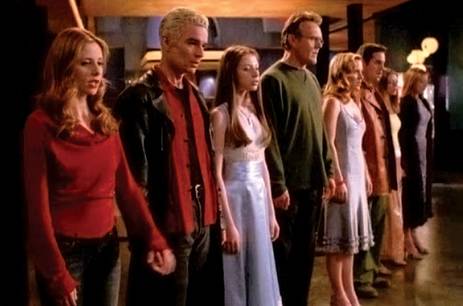
Season six is similar to the first season of The Leftovers: it’s basically a litmus test for whether you can connect to relentlessly depressing stories. The misery almost never lets up in season six, which was clearly intentional. Like The Leftovers, it’s supposed to be a metaphor for being in the throes of depression; even when there’s a lighthearted episode, there’s a huge pall hanging over it, because that’s what depression is like. It’s difficult to watch, and there are a few big blunders, such as the all-too-overt preaching about drug addiction and one of the most famous instances of the Dead Lesbian trope. But still, it arguably has more significant character development and adult themes than the first five seasons combined. (And it also has OMWF and the revelation that Sunnydale is a figment of Buffy’s imagination, which doesn’t hurt.)
“Normal Again” is not all that ambiguous
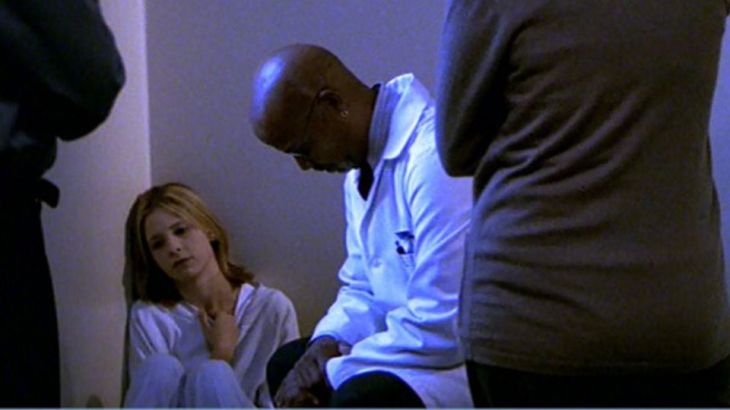
“Normal Again” inspired the biggest non-shipper debate in the Buffy fandom: is Sunnydale a real place, or the figment of a sick girl’s imagination? For most of the episode, it’s entirely ambiguous; it makes perfect sense that a schizophrenic would imagine herself as the “Chosen One,” essentially another Messiah. But then again, it’s equally possible that the demon is making Buffy hallucinate an alternate life for herself in order to drive her crazy and/or make her kill all of her friends.
But then the ending happens. Buffy takes the medication that counteracts the demon’s toxin, and her hallucinations stop completely. But then, there’s still a scene with Joyce and the doctor looking at a catatonic Buffy, which is completely separate from Buffy’s consciousness. As a result, the visions must at least be a peek into an alternate universe and/or timeline. I would accept the argument that an alternate universe is more likely than Sunnydale being completely imagined, because in the latter case, it wouldn’t make much sense that so much happens without Buffy knowing it (unless it’s some sort of Sims situation, where she imagines a third-person version of herself in the middle of a sprawling fictional world). But there’s really no arguing that the hospital isn’t real.
“Chosen” is a better series finale than “The Gift”
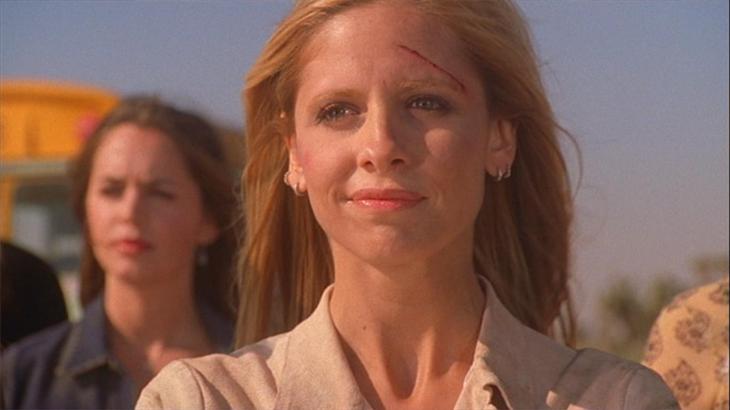
“The Gift” was a beautiful ending to season five, and one of the best season finales that’s ever aired. And in spite of my love for season six, I used to think that should have been the ending. Buffy has a classic hero’s arc in “The Gift,” in which she is marked for death and ultimately sacrifices herself for a worthy cause after sufficient reflection on her fate.
If it had ended there, “The Gift” probably would have gone down as one of the most brilliant series finales in history. But while “Chosen” isn’t quite as powerfully written, it makes for a better ending, one essential to securing Buffy‘s feminist legacy. If Buffy’s story had ended with her sacrificing herself, she would have simply been a female version of every other male superhero with a broadly similar ending. But instead, “Chosen” very consciously subverts the “special girl” trope by undermining some of the most problematic aspects of the show. The show was never particularly race-conscious (Kendra and the First Slayer immediately come to mind, and not in a good way), and that didn’t change too much when the Slayerettes came along. But still, the seventh season was essential to building a more inclusive feminism that promoted the power of all women, rather than just one upper-middle-class white blonde woman.
It’s true that after season five, and in the last season especially, Buffy’s character loses a little of what made her charming and special. She loses a little bit of faith in her lifelong maxim: “I can be a great hero as well as full of feeling.” She becomes a bit more like the hero that all of the patriarchal forces in her life try to mold her into. She becomes less well-rounded and more ruthless, prioritizing efficiency over relationships, acting alone when she should have been collaborating. But that character arc, while not particularly fun to watch, is both realistic and necessary. Buffy has been through so much at that point, it makes sense that she would become hardened and closed off to others. And as much as I hate, hate, hate the gang kicking her out of house, she needs to hit rock bottom to realize that she can’t (and shouldn’t) go it alone. She realizes that she’s alone in her burden only because “a bunch of men who died thousands of years ago made up that rule.” Making all potentials Slayers is the perfect ending to Buffy’s arc, which includes her rejection of all patriarchal rule-makers like the Council, the Initiative, and even Giles to some extent. The ending of “The Gift” would have been Buffy playing within the schema determined by old white men; “Chosen” is Buffy doing things her own way, as it should be.


This was a great read. I agree with a lot of these and your specific points on them, but your perspective was interesting to read even where I don’t agree. Really quality stuff – thanks for posting!
LikeLiked by 1 person
[…] it’s been more than 20 years. Feel […]
LikeLike